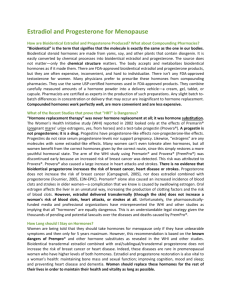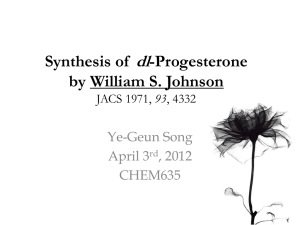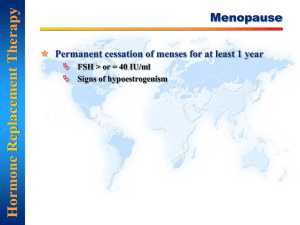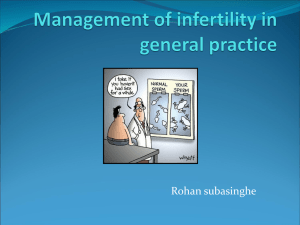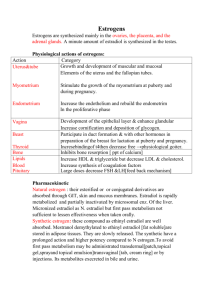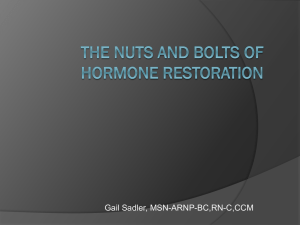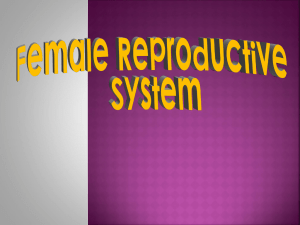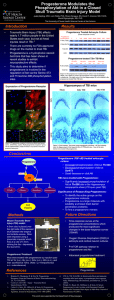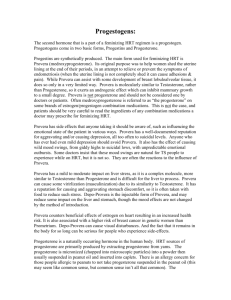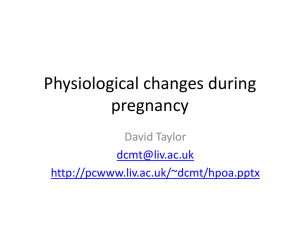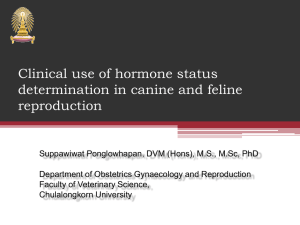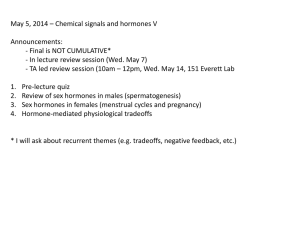File
advertisement
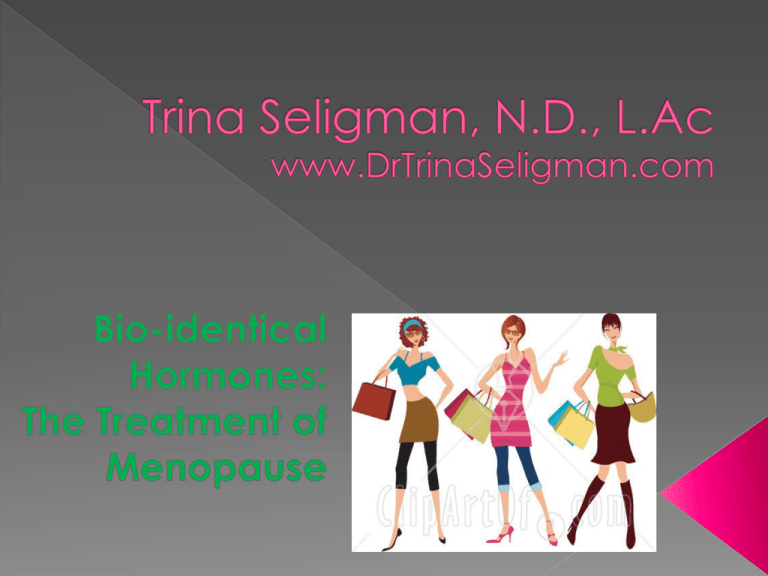
Family practice 15 years of practice Bellevue Specializing in natural medicine : nutrition, herbs, bio-identicals, lifestyle, Acupuncture My approach is Integrative: integrating the best of conventional and natural medicines and integrating care with your other physicians. Covered by all insurance companies The symptoms of menopause can start as early as the late-30’s, with most significant symptoms in the late 40’s Symptoms include: hot flashes, nightsweats, sleep disturbance, depression, anxiety, weight gain, arrhythmia, vaginal dryness, low libido, cognitive changes, changes in pelvic floor/urethral tissue, menstrual cycle changes, headaches/migraines, fatigue etc…… “Bio-identical” is a term that was coined to mean ‘biologically identical’. Prior to menopause, a woman produces 3 different estrogens: •Estrone •Estradiol •Estriol A woman also produces Progesterone Testosterone DHEA Examples of Estrogen: Ethinyl Estradiol Conjugated Equine Estrogens (Premarin) Estradiol Acetate “Progesterone” actually, should be called a Progestin: Medroxyprogesterone Norethindrone Drospirenone Levonorgestrel Methyl-testosterone Although DHEA declines with age and can impact the symptoms of menopause, it is not usually treated by OBGyn’s Estrone Estradiol Estriol Progesterone Medroxyprogesterone Norethindrone Drospirenone Levonorgestrel Methyltestosterone Testosterone DHEA Ethinyl Estradiol Conjugated Equine Estrogens Esterified estrogens Estradiol acetate Postmenopausal Estrogen/Progestin Interventions Trial Premarin + bio-identical progesterone, Premarin alone, Premarin +medroxyprogesterone Increased HDL cholesterol was seen to the greatest benefit with the bioidentical progesterone group. Study of Premarin (conjugated equine estrogens) or Prempro (Premarin + medroxyprogesterone) Over 16,000 women Study was halted due to increased risk of breast cancer, stroke, and blood clots. Estradiol is assoc. with increased risk of breast cancer when used for >5 years, but not <5 years. French E3N-EPIC study of over 54,000 women found greater risk of breast cancer with synthetic progestins. 2005 Natural Progesterone has an anti-proliferative effect on breast tissue Prometrium when compared to Progestin did not adversely effect HDL Preliminary research shows E2 +Prometrium protect against coronary vasospasm (contrary to Progestin) Estriol –preliminary research suggests it may be protective to breast tissue Estrogen alone has a beneficial effect on bone density; estrogen + progesterone the results are mixed. Progesterone has a calming effect on the nervous system, Progestins actually increased risk of dementia. Menopause is NOT a disease, it is a stage of life: Treat based on Quality of Life symptoms Genetics Personal Philosophy Treat with the lowest possible dose to alleviate side effects, for the shortest duration (usually 5 years) Salivary testing Blood testing Urine testing Testing of estrogen & progesterone is not necessary, unless needed to monitor efficacy & safety of treatment Testing of DHEA-S and testosterone can be helpful Benefits of Blood testing Originally derived from soy or wild yam (dioscorea), chemically modified Compounding pharmacies-benefits of individual dosing, different delivery systems, lack of additives/chemicals to formulations “Bi-est” meaning two estrogens; estradiol and estriol (80/20) Progesterone Creams (transdermal) Sublingual drops Pills suppositories Bi-est Progesterone Testosterone DHEA Estradiol tablet (Estrace, Gynodiol) -Vivelle, Climara, Estraderm, Menostar Estring, Estrace, Vagifem Prometrium No testosterone or DHEA alternative from conventional pharmacies. Estrace: includes corn starch, lactose, blue 1, red 27, yellow 5 (tartrazine) Estrace Cream: includes propylene glycol, sodium lauryl sulfate, methylparaben, EDTA (an organic pollutant), tertiary-butylhydroquinone (an organic phenol) Prometrium : contains peanut oil, yellow 10 and red 40 Suzanne Somers What does “anti-aging” mean ? Dose of hormones Menstrual cycles Continued use of hormones > 5 years Long term safety is not known Herbal medicine: Phytoestrogens: dang quai, black cohosh, soy, cimicifuga, Phytoprogesterones: dioscorea, vitex, glycyrrhiza No plant-based DHEA or testosterone Other libido-assisting herbs: maca, damiana leaf, black cohosh, dioscorea, ashwaghanda, muira puama, ginko biloba Herbal medicine can also help with sleep issues, depression, anxiety, cholesterol Nutritional Supplements: evening primrose oil, hesperidin, flax seed, ipriflavone Vitamin D,calcium,magnesium strontium, boron, minerals Acupuncture: Lifestyle : Diet –alcohol, sugar, sleep, Decreasing processed foods exercise Bloodwork: chemistry, CBC, TSH, lipid panel, 25-OH-vitamin D, CRP, homocysteine Consider VAP testing Bone Density: 1 year post-menopause Colonscopy: age 50 Mammogram Annual pap/physical Consider advanced nutrition testing Hormone Replacement is an individual decision, based on quality of life issues, genetics and personal philosophy Bio-identical hormones are “biologically identical” Compounding pharmacies specialize in manufacturing natural products including hormones Research is limited Safety is a balance Testing is not necessary, unless to assess treatment efficacy & Safety Anti-aging has not been studied longterm Acupuncture, herbal medicine, lifestyle Trina Seligman 425-646-4747 www.eimed.com www.DrTrinaSeligman.com Sign up for our newsletter www.DrTrinaSeligman.com Facebook.com/EvergreenIntegrativeMedicine Natural Progesterone: The Multiple Roles of a Remarkable Hormone. Dr. John Lee The Wisdom of Menopause. Christiane Northrup What your doctor may not tell you about menopause. Dr. John Lee Natural Hormone Replacement. Jonathan Wright Smart Medicine for Menopause. Sandra Cabot Screaming to be heard. Elizabeth Vliet The Hormone of Desire. Susan Rako
